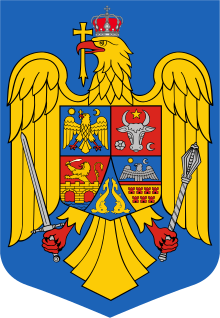Romania–Ukraine relations
Romanian-Ukrainian relations are foreign relations between Romania and Ukraine. Diplomatic relations between both countries were established in 1992. Romania has an embassy in Kiev and two Consulates-General (in Chernivtsi and Odessa). Ukraine has an embassy in Bucharest and had a consulate in Suceava that closed down in 2014 due to lack of funding.[1]
 | |
Romania |
Ukraine |
|---|---|
Disputes
Romania and Ukraine had been negotiating a broad treaty of friendship and cooperation for several years, but disagreement over ownership of the Snake Island and more importantly the oil and gas reserves that are thought to lie beneath its area of the Black Sea, as well as the northern border of Romania with Ukraine, had kept the sides apart. In June 1997, Romania signed a bilateral treaty with Ukraine that, among other concerned, resolved territorial and minority issues that had impeded the development of improved relations between the two countries:
- The dispute between Romania and Ukraine over borders near the Snake Island (approx 50 km east of Sulina) and its continental shelf of the Black Sea under which significant gas and oil deposits may exist, has been resolved after the 2009 ruling of the International Court of Justice.[2]
- The dispute between Romania and Ukraine over the construction of the Bystroye Canal.[3]
Maritime delimitation
The status of Snake Island was important for delimitation of continental shelf and exclusive economic zones between the two countries. If Snake Island were recognized as an island, then continental shelf around it should be considered as Ukrainian water. If Snake Island were not an island, but a rock,[4] then in accordance with international law the maritime boundary between Romania and Ukraine should be drawn without taking into consideration the isle location.
On 4 July 2003 the President of Romania Ion Iliescu and the President of Russia Vladimir Putin signed a treaty about friendship and cooperation. Romania promised not to contest territories of Ukraine or Moldova, which it lost to Soviet Union after World War II, but requested that Russia as a successor of the Soviet Union recognized in some form its responsibility for what had happened.[5]
On 16 September 2004 the Romanian side brought a case against Ukraine to the International Court of Justice (ICJ) in a dispute concerning the maritime boundary between the two States in the Black Sea.[6]
On February 3, 2009, the ICJ delivered its judgment, which divided the sea area of the Black Sea along a line which was between the claims of each country. The Court invoked the disproportionality test in adjudicating the dispute, noting that the ICJ, "as its jurisprudence has indicated, it may on occasion decide not to take account of very small islands or decide not to give them their full potential entitlement to maritime zones, should such an approach have a disproportionate effect on the delimitation line under consideration" and owing to a previous agreement between Ukraine and Romania, the island "should have no effect on the delimitation in this case, other than that stemming from the role of the 12-nautical-mile arc of its territorial sea" previously agreed between the parties.[7]
See also
References
- Consulatul General al Ucrainei se închide din 15 noiembrie, din lipsă de finanțare MEDIAFAX (10 October 2014)
- Ukraine loses the dispute over Snake Island to Romania, Centre for Eastern Studies (3 February 2009) Archived May 24, 2012, at the Wayback Machine
- Ukraine – Romania: a sustained deadlock, Centre for Eastern Studies (30 December 2011)
- Ruxandra Ivan (2012). New Regionalism Or No Regionalism?: Emerging Regionalism in the Black Sea Area. Ashgate Publishing, Ltd. p. 167. ISBN 978-1-4094-2213-6.
- Russia and Romania: compromise on history. BBC Russia. 4 July 2003
- "Romania brings a case against Ukraine to the Court in a dispute concerning the maritime boundary between the two States in the Black Sea" (PDF). International Court of Justice. September 16, 2004. Archived from the original (PDF) on December 3, 2008.
- "The Court establishes the single maritime boundary delimiting the continental shelf and exclusive economic zones of Romania and Ukraine" (PDF). International Court of Justice. February 3, 2009. Archived from the original (PDF) on February 5, 2009.

